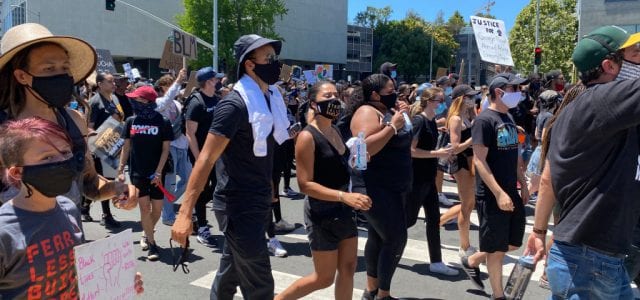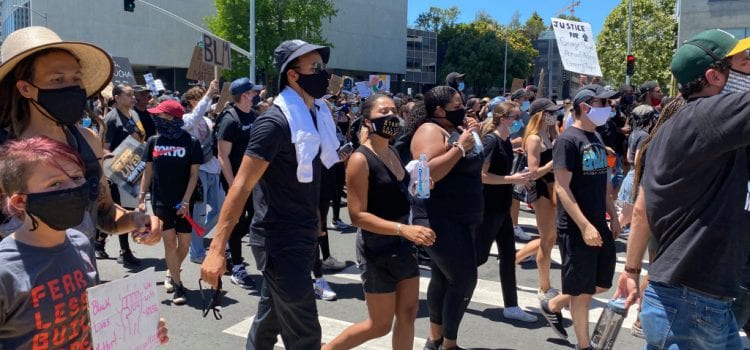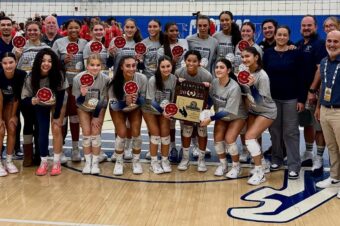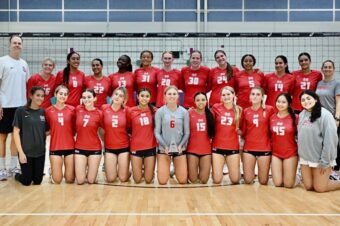


With a world enveloped in protests over social injustice combined with a COVID-19 pandemic, Warriors star Stephen Curry delivered a message of hope to young people Friday.
“This is a great time to be alive,” Curry said near the end of a virtual discussion entitled “The Dream Marches On” hosted by USF. “I’m excited to see what this next generation does as they venture out on their own. The people I got to walk with at a protest, young men and women of all ages, people are meeting the moment.”
Curry was featured with Clarence B. Jones, director of USF’s Institute for Nonviolence and Social Justice and former lawyer and speech writer to Dr. Martin Luther King, Jr. The hour-long talk was hosted by Jennifer Azzi, the former Stanford basketball star, USF basketball coach and now an associate vice president of engagement for at the university.
The Warriors star and his wife Ayesha agreed to match up to $50,000 in donations made through June 30 to the USF institute through their own “Eat, Learn, Play” foundation.
“This has been the culmination of 400 years of injustices in a system that is not working for all people in this country,” Curry said. “It took a perfect storm of two pandemics at one time to grab everybody’s attention. We’re obviously dealing with COVID and its threat to our society, and that has opened up a conversation and an awareness level for all people. I hope the conversation continues, and that this isn’t just a moment, but a movement and we find changeable actions where everyone can play their role and play their part.”
Jones, who authored the first seven paragraph of Dr. King’s “I Have a Dream” speech, expressed disbelief that he’s seeing protests “similar to what went on 50 and 60 years ago, yet has been heartened to see the the involvement of white America in the protests over social injustice ignited by the May 25 death of George Floyd following a traffic stop by Minneapolis police.
“When we had the March on Washington (in 1963) we had maybe 25 percent of the march participants were white,” Jones said. “But guess what? African Americans only constitute 12 or 13 percent of the population. The overwhelming majority of the protestors are white people. Look at those pictures. It’s amazing.”
Jones, 89, said he hoped protests would get “longer and longer and larger and larger until the country understands, stop it, it’s enough. Stop killing us.”
Curry brought his 7-year-old daughter Riley to a recent protest in East Palo Alto.
“She knew who George Floyd was, she started asking questions as people were giving speeches, she continued to ask questions about why are we here, what does this mean, what are we trying to accomplish,” Curry said. “Trying to break that down to a 7-year-old, you hope she can be part of the change that needs to happen.”
The role of social media, Curry said, is crucial to the struggle.
“There’s obviously some negatives that come with it, but the positives are way out-reaching in terms of exposing people for who and what they are, being able to rally around a movement like this where you can speak your mind,” Curry said. “You don’t have to go through any other third party. It’s what you want to say, when you want to say it, and that can motivate somebody else to be bold in their speech. That’s a huge part of awareness, but it cannot stop there.”
Curry stressed “difficult conversations” with most everyone he meets.
“It’s not going to be an overnight thing where you can just rectify 400 years of injustices,” Curry said. “I’m trying to create a program, a platform of questions I’m asking every single person I do business with, that I have personal relationships with, that will hopefully inspire them to carry that torch and do it in their own circles and we can have a wildfire spread like that.”
While Jones grew up the only child of domestic servants and described being chased by white children on his bicycle while venturing out to get some candy in 1931, Curry was fortunate to be the son of NBA player Dell Curry. His parents, having grown up in rural Virginia, had experienced racism but were able to shield Stephen and his brother and sister while at the same time educating them on the matter. Curry, who was raised Charlotte, North Carolina, had a different experience.
“I was surrounded by (racism) but I didn’t experience it as much because my dad was playing in the NBA and there was a certain benefit that came with that in terms of how people interacted with us,” Curry said. “Sports took us to a place where they could put it aside for a second and treat my dad and my family with a level of respect you could feel, but you never knew what was going to happen as soon as your back was turned.
“I was always reminded of their experience. I’ve had countless family members get trapped in the judicial system with unfair convictions and lengthy sentences that didn’t fit the crime. I heard their stories and still feel them today. Their life was altered by being targeted, being prejudiced, being racially stereotyped.”
Curry, by contrast, has been pulled over by police and let go based on his fame more time than he cares to count.
“That’s not a great place to be when you’re trying to make a difference,” Curry said.








